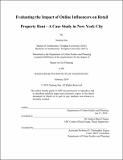| dc.contributor.advisor | Andrea Marie Chegut. | en_US |
| dc.contributor.author | Sun, Xudong,M.C.P.Massachusetts Institute of Technology. | en_US |
| dc.contributor.other | Massachusetts Institute of Technology. Department of Urban Studies and Planning. | en_US |
| dc.coverage.spatial | n-us-ny | en_US |
| dc.date.accessioned | 2019-07-17T21:00:57Z | |
| dc.date.available | 2019-07-17T21:00:57Z | |
| dc.date.copyright | 2019 | en_US |
| dc.date.issued | 2019 | en_US |
| dc.identifier.uri | https://dspace.mit.edu/handle/1721.1/121752 | en_US |
| dc.description | This electronic version was submitted by the student author. The certified thesis is available in the Institute Archives and Special Collections. | en_US |
| dc.description | Thesis: M.C.P., Massachusetts Institute of Technology, Department of Urban Studies and Planning, 2019 | en_US |
| dc.description | Cataloged from PDF version of thesis. | en_US |
| dc.description | Includes bibliographical references (pages 97-101). | en_US |
| dc.description.abstract | This study proposes a framework of analyzing online influencer behavior and evaluating its impact on retail rent using spatial econometric methods, in which we also examined the spatial autocorrelation and heterogeneity in New York's retail rent market. We use social media data mining and network analysis techniques to examine influencers and information diffusion in Instagram and develop metrics to quantify the impact. Using spatial econometric models, we construct models of retail rents that include the effect of online influencers and traditional hedonic features. The result suggests that online influencer behavior have a significant correlation with effective rents of retail real estate in the case study area of New York. We also examine the spatial spillover effect and spatial heterogeneity of the influencer effect. Our results provide the first analysis to link online behavior to retail real estate, it also proposes a framework to study the real estate by linking online and offline world, which is meaningful for retail real estate challenged by e-commerce and other forms of new economy. | en_US |
| dc.description.statementofresponsibility | by Xudong Sun. | en_US |
| dc.format.extent | 1001 pages | en_US |
| dc.language.iso | eng | en_US |
| dc.publisher | Massachusetts Institute of Technology | en_US |
| dc.rights | MIT theses are protected by copyright. They may be viewed, downloaded, or printed from this source but further reproduction or distribution in any format is prohibited without written permission. | en_US |
| dc.rights.uri | http://dspace.mit.edu/handle/1721.1/7582 | en_US |
| dc.subject | Urban Studies and Planning. | en_US |
| dc.title | Evaluating the impact of online influencers on retail property rent : a case study in New York City | en_US |
| dc.type | Thesis | en_US |
| dc.description.degree | M.C.P. | en_US |
| dc.contributor.department | Massachusetts Institute of Technology. Department of Urban Studies and Planning | en_US |
| dc.identifier.oclc | 1102053420 | en_US |
| dc.description.collection | M.C.P. Massachusetts Institute of Technology, Department of Urban Studies and Planning | en_US |
| dspace.imported | 2020-03-09T19:57:49Z | en_US |
